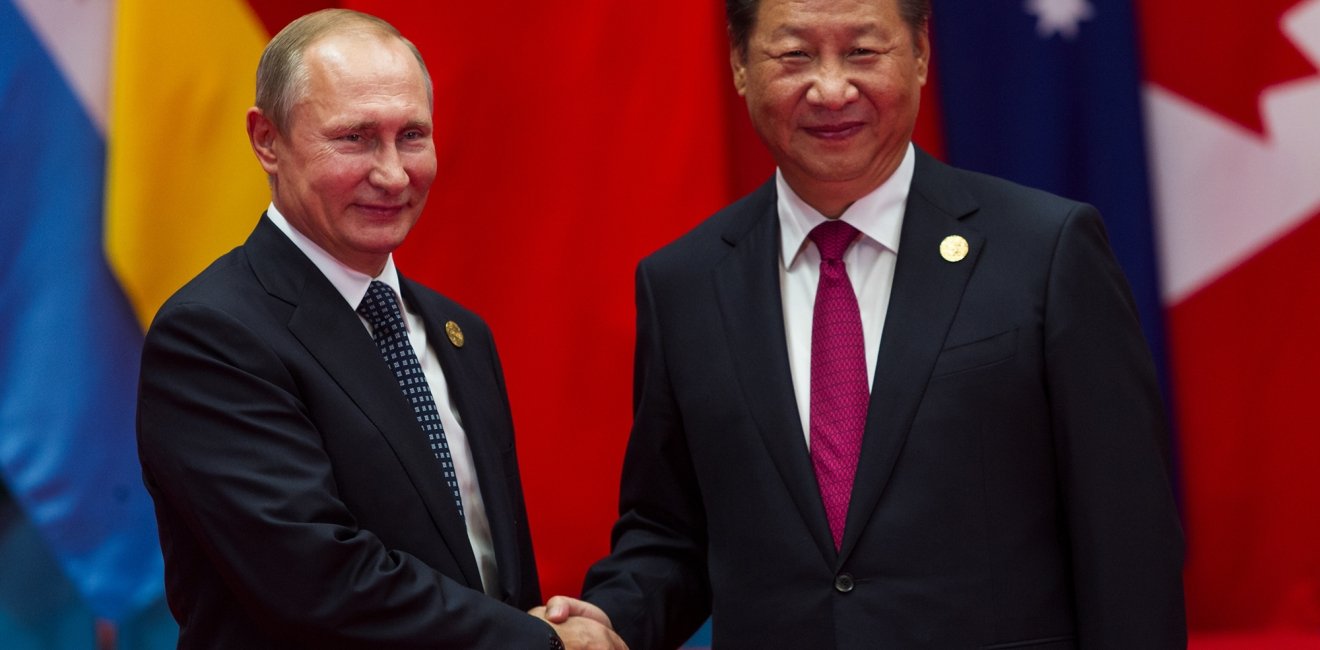
A blog of the Indo-Pacific Program
Over the past month, the awful, heroic war for Ukraine has riveted the attention of governments and the public alike across Europe and the United States. But there is another important and attentive spectator, China — a fact underlined by President Biden’s important phone conversation with President Xi recently. Vladimir Putin’s decision to launch a full-scale invasion of Ukraine followed closely upon his high profile meeting with Xi at the opening of the Beijing Winter Olympics. There, the two leaders declared to the world that their partnership had “no limits.”
The Xi/Putin bromance is no flash in the pan. The two leaders have met over 30 times. Xi has declared that Putin is his “closest friend” and the evident personal bond rests on shared political/strategic views. Both are determined to hold power for life, and share a conviction that the United States stands in the way of their grandest ambitions. At a minimum, Putin’s ambition demands a restoration of Kremlin rule over all regions within Russia’s historic cultural sphere, most notably Ukraine. At a maximum, the Kremlin foresees the restoration of Soviet era dominance over east and central Europe — from St. Petersburg to Berlin. Xi’s minimum ambition requires Chinese hegemony over East Asia from Hokkaido to Tasmania. At a maximum, China intends to replace the United States as the world’s preeminent global power.
Xi and Putin share a need for strategic tranquility along their lengthy common border — freeing Russia to focus west and China east and south. Both share a perceived internal “terrorist” threat from Muslim minorities in Chechnya and Xinjiang. For China, an ambitious Russia diverts U.S. attention and resources away from Asia. For Putin, China’s growing power serves a comparable Russian interest in Europe. Both see “western values” such as democracy and human rights as a threat and an obstacle — illustrated by China’s massacre of pro-democracy demonstrators at Tiananmen and Russia’s suppression of “color revolutions.” Finally, there are real economic interests involved; Russia is an important and growing source of imported energy (natural gas and oil) for China while Beijing is Moscow’s largest trading partner. China has long relied on Russia as a source of advanced weapons systems — a relationship that may have largely run its course as Chinese weapons technologies rise to Russia’s level. All this and more provide the backstory to the photos of Xi and Putin celebrating their “unlimited” partnership.
The actual events in Ukraine will have come as a shock to the Chinese leadership.
It is not clear whether Putin forewarned Xi of his intentions to invade Ukraine. U.S. intelligence agencies seem to think that he probably did. Even if that is true, Putin almost certainly portrayed the imminent special military operation as quick, easy and largely bloodless. As such, it might provide something of a template for a Chinese military operation to seize control over Taiwan. The actual events in Ukraine will have come as a shock to the Chinese leadership. The Russian invasion has become a daily demonstration of military ineptitude and crude brutality. As of this writing, 25 days since the invasion, Russian forces have yet to fully occupy a single Ukraine city (while reducing several to rubble). Expert observers (conservatively) estimate seven thousand Russian soldiers have died, including four generals — more than the United States lost over 20 years in Afghanistan and Iraq combined. Half the Russian army is now committed to the Ukraine war — including large numbers of conscripts that Putin pledged, in a national TV address, would never be sent. No one is watching this debacle more closely than the military men in Beijing.
Taken together, the war in Ukraine has put China in a very difficult spot. President Xi, the all-powerful, all-knowing leader, has put his personal imprimatur on a close partnership with Russia. Chinese media and public opinion have rallied in support of Putin’s falsehoods about “Nazis” in Ukraine and the supposed threat Ukraine poses to Russia. But elite opinion in the universities, think tanks, and even the government is far less enthusiastic. In the teeth of pervasive censorship, eminent Chinese intellectuals in China and abroad have sounded a warning. One critic observed that Chinese officials were nervous because the regime is “tied to Russia’s war chariot, and knows this is very dangerous.” Another commented, “To hang yourself on the Russian tree, I think that is like committing suicide, at least economic suicide.”
The effect is searing; it is transforming European attitudes toward NATO, defense, the United States — and especially toward Russia.
There is good reason for such unease. Both Russia and China have a huge stake in economic ties for trade, investment, technology exchange with Europe. But the carnage in Ukraine is playing out on TV and device screens across Europe every day and night. The effect is searing; it is transforming European attitudes toward NATO, defense, the United States — and especially toward Russia. An incandescent hatred for Putin and Russia is burning and it may burn for a long time. Under the weight of unprecedented sanctions, Russia’s economic future is dire. The Russian economy will be reduced to half its former size. The well of European-Russian economic relations has been poisoned. For China, the question is whether it is willing to risk its own deep economic relationship with Europe by being seen as a partner and enabler of Putin’s war crimes.
It is worth noting that China’s trade with Germany alone is nearly double China’s trade with Russia. Xi’s signature foreign policy initiative — the new silk road — is designed to connect China to Europe economically. Already there are multiple signs that European opinion regarding China is souring — and fast. That same process has advanced even further in America. In a real sense, Biden’s two-hour phone conversation with Xi was a critical last chance to persuade China to back away from the destructive, borderline suicidal, path chosen by Russia.
Follow the Asia Program on Twitter @AsiaProgram. or join us on Facebook.
The views expressed are the author's alone, and do not represent the views of the U.S. Government or the Wilson Center. Copyright 2020, Asia Program. All rights reserved.
Author

Adjunct Professor, Johns Hopkins University; Former Professor of National Security Policy, National War College and Deputy Staff Director, Senate Select Committee on Intelligence

Indo-Pacific Program
The Indo-Pacific Program promotes policy debate and intellectual discussions on US interests in the Asia-Pacific as well as political, economic, security, and social issues relating to the world’s most populous and economically dynamic region. Read more





